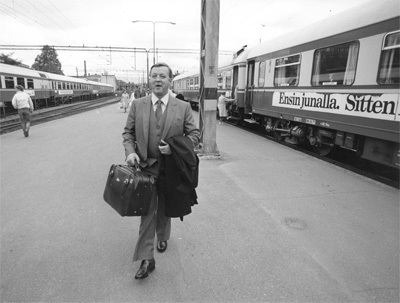If it looks like a duck, swims like a duck, and quacks like a duck, then it probably is a duck.*
While reading Diana’s amazing book, American Betrayal, the thought of Finland’s government during the Cold War period having been infiltrated by the Soviets often crossed my mind. The Finnish political/media/academic elite for the most part, stand united along the lines that all of Finland’s politicians had to, in one way or another, engage with the Soviet diplomatic / KGB operatives as an unfortunate part of their political duty and careers. According to the official narrative, it was the reality of the Finnish political situation during the Cold War, what was a small country to do in relation to a major superpower it shared an entire eastern border with?
I was forwarded the following article written by the Russian scientist/Soviet dissident/writer/political activist, Vladimir Bukovsky about his book, Judgement in Moscow, from which I include this excerpt. In my opinion, writing off various Finnish politicians’ involvement with Soviet influence peddlers and spies as ”just a product of the Cold War period”, doesn’t past the smell test. The fact that the late Kalevi Sorsa (SDP) as acting Prime Minister collaborated with the Soviets, and held more than favorable views of the Soviets, detente and disarmament, who was also a vice-president of the Socialist International and who:
In the late 1970s and in the 1980s the SI had extensive contacts and discussion with the two leading powers of the Cold War period, the United States and the Soviet Union, on issues concerning East-West relations and arms control. The SI supported détente and disarmament agreements, such as SALTII, START and INF. They had several meetings and discussion in Washington, D.C. with President Jimmy Carter and Vice-President George Bush and in Moscow with Secretaries General Leonid Brezhnev and Mikhail Gorbachev. The SI’s delegations to these discussions were led by the Finnish Prime Minister Kalevi Sorsa.[15]
Détente was a Soviet linchpin policy for Western accommodation of Soviet hegemony (and tyrannical rule), as well as affording it the needed platform to trumpet its moral equivocation with the free West, all the while as it sought to undermine their institutions and wrestle the mantle of morality from the free West upon the battlefield of ideas. Pretending not to want to destroy the West while working to destroy the West.
Kalevi Sorsa was a big player on that scene, wheeling and dealing more than any other Finnish politician outside of former Finnish president Martti Ahtisaari (SDP), whose political international career has been more within UN and humanitarian industry circles. Unfortunately however, it would appear that Sorsa’s relations with the Soviets, and the out of proportion influence he wielded internationally during the hey day of Soviet power, wouldn’t have been of more interest to the international media and historians if he had been a Norwegian and not a Finn. They were/still aren’t interested at all, why is that?
NOTE: Kalevi Sorsa’s last name is literally, duck.
BOOK EXCERPT: JUDGEMENT IN MOSCOW
by VLADIMIR BUKOVSKY 27 Nov 2013, 10:26 AM
[…]
Right in front of me lies a document concerning a person I have never met, about whom I never knew anything, but who, it emerges, is well known both in his own country, and in international political circles. Moreover, it appears that he could have become the next President of Finland. The title of the document is not exciting: “On measures connected with the 50th birthday of the chairman of the Social-Democratic Party of Finland, K. Sorsa.” Nor was the text of the resolution adopted by the Secretariat of the Central Committee (16 December 1980)<1> particularly interesting: it instructed the Soviet ambassador in Helsinki to pay K. Sorsa a visit with birthday greetings, and to present him with a gift on behalf of the CC CPSU. Possibly the seeming innocence of this particular paper explains why I got it so easily, without any fuss and bother, from the Central Committee archive. The puzzling thing was that it was marked “top secret”. This aroused my curiosity: why should a decision to convey birthday greetings to the leader of the largest political party in a neighboring neutral country, a former prime minister, be shrouded in such secrecy?
So I started digging deeper in order to obtain supplementary documents to this resolution of the CC – after all, they made their resolutions on the basis of various reports and recommendations. Nothing was ever done just like that. And finally, after many attempts and stratagems which I won’t detail, I got hold of the materials I was after, or, rather, a report by the International Department of the Central Committee. I reproduce it here in full
Secret CC CPSU
On measures connected with the 50th birthday of the chairman of the Social-Democratic Party of Finland K. Sorsa.
On 21 December 1980, the chairman of the Social-Democratic Party of Finland (SDPF), K. Sorsa, celebrates his 50th birthday. In his party and governmental activities (as Prime Minister, Minister of Foreign Affairs and chairman of the parliamentary committee on foreign affairs), Sorsa consistently maintains positions friendly to the USSR and the CPSU, promotes the development of Soviet-Finnish relations and fosters stable contacts between the SDPF and our party. On the international scene, first and foremost in the Socialist International, Sorsa, in confidential collaboration with us, works for detente, for the limitation of the arms race and for disarmament.
In view of the above mentioned, and the circumstance of Sorsa’s election as one of the vice-chairmen of the Socialist International at its last congress, where Sorsa will continue to coordinate the activities of this organization on matters of detente and disarmament, and bearing in mind his contacts with other political forces, we deem it worth charging the Soviet ambassador in Finland to congratulate Sorsa on his 50th birthday and to present a gift.
Draft CC CPSU resolution appended.
Deputy head of the International Department of the CC CPSU (A. Chernyayev) 11 December 1980
#18-S-2161
Clearly, the above information is not unimportant, and for Finland – sensational. It shows that a man who declared his candidacy for the post of President of Finland in 1992 engaged in “confidential collaboration” with an enemy power while holding the posts of Prime Minister, Minister of Foreign Affairs and leader of the largest political party. It is not unlikely, moreover, that he was “Moscow’s man” in the Socialist International, where, as vice-president, he would have exercised enormous influence. Let us recall that period, the last contortions of the Cold War: European streets teeming with Moscow-inspired “peace” demonstrations, protesting against NATO plans to site medium-range nuclear missiles in Europe. At the center of the campaign – European socialists and social – democrats, many of them in the government of their own countries, or, at least, leaders of the main opposition forces. And in the center of that center – K. Sorsa, who coordinates the Socialist International’s activities on matters of detente and disarmament while “confidentially collaborating” with the CPSU on these very issues. Not bad, is it?
One would think that a piece of information such as this would be a treasure-trove for the Finnish press in the run-up to the presidential election. But no. MORE THAN SIX MONTHS PASSED SINCE THIS DOCUMENT WAS OFFERED TO THE LARGEST NEWSPAPERS IN FINLAND – WITH NO RESULT. So what? Who cares? Only half a year later, thanks to the efforts of some of my friends, the document finally made the papers in Finland, and Mr. Sorsa, after a public scandal, withdrew his candidacy<3>.
I can find no explanation for such a state of affairs. I am told that “people are tired of the Cold War”, that they do not want to know about that very recent past. But is it the task of the press to decide what the public should or should not know about their future president? Surely the press has a duty to inform the public, and then let the public decide what it needs or does not need to know. Beyond a doubt, had the information concerned a putative president’s love affair or some petty corruption, it would have made front-page headlines in every Finnish newspaper.
It is interesting to recall how several years earlier, a grandiose scandal erupted in another neutral European country – Austria: it became known that a presidential candidate had, some 50 years ago, “collaborated confidentially” with the Nazis as a mere junior officer. And, although the electorate chose to ignore this fact, the Austrian press was full of the matter down to the smallest detail. Indeed, the whole world raised a storm of protest, and the world press covered it as an event of primary importance. The strange thing is, however, that in this instance, nobody thought to say:
“So what? Who cares?”
**************************
It could be argued, of course, that Finland is a special case, and that the term “finlandization” is no accident, that, in actual fact, the whole country could be said to have “collaborated confidentially” with Moscow. For Finland, this is no crime and no sensation. And what else could be expected from a small, neutral country which has to live side-by-side with the Big Grey Brother? But Norway is also a neighbor, and it did not “finlandize.” Geography is not the crucial factor. The term “finlandization” was coined not in Finland, but in West Germany, by far not a neutral country, and one which the West took up obligations to defend – unlike Finland – but in which this process took root and flourished.



It wasn’t the whole country but the political elite. Those who wanted to be part of it had to follow certain rules, which included positive attitude towards Fenno-Soviet friendship and cooperation as well as loyalty to the Paasikivi-Kekkonen line in foreign policy.
The fact that Sorsa was a “Moscow man” has already been published in a book by Alpo Rusi. Some of the politicians who had relations with the Soviet intelligence went too far, usually to gain political influence in the Finlandization era. Others kept the necessary distance, even though they supported the official foreign policy.
The close relations between leading Finnish politicians and the Soviet intelligence were first revealed to the Finnish public in the early 1980’s. These relations were characterized as the “Kotiryssä” (“Home Russian”) system.